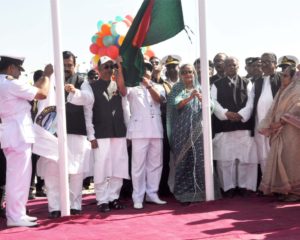LET US DETERMINE OUR PRIORITY

- F R Chowdhury
Recently International Maritime Organization (IMO) concluded its Council and 30th Assembly in its own headquarters in London. IMO is a specialised agency of the United Nations that look after safety and security of shipping along with protection of the marine environment. The Council of IMO is like the governing body that approves activities of the committees and approves the budget. Council members have lot of clout as it selects and nominates the next secretary general (chief executive) for final approval of the Assembly. Bangladesh had been a member of this prestigious council since 2003 but failed to get re-elected this year.
The failure to get re-elected as a council member has disappointed many in Bangladesh. The question remains as to how important it was to get elected. There is nothing more than a bit of image and prestige. Bangladesh is a developing country. It cannot afford to maintain a permanent representative at IMO. It cannot even attend all committee or sub-committee meetings. Council members are required to attend all council meetings at own expense to make their contribution in future guidance for IMO. Bangladesh is obviously far from it. It has so much to do at home before it can make any impact on international forum.
Legislation lays the foundation for future growth. Our existing legislation is totally obsolete and provides no help to the growth of the sector. Our legislation is so frightening that some of our ship-owners are having their ships registered elsewhere. This is not helpful to our economy. We must have modern user friendly legislation. Why a ship has to be brought to Bangladesh for registration? I worked as a Deputy Director of Bahamas Maritime for nearly four years. At that time Bahamas was the third largest ship register in the world. Ships changed into Bahamas flag in Asia, Europe, Africa or Australia. Some of those ships never even visit Bahamas in their life time. They trade all over the world but their flag remain Bahamas.
When a ship is eventually brought to Bangladesh, a battalion of custom officials board the vessel in name of assessment. It is sheer nuisance and harassment. Ships will be registered on payment of registration fees. Periodical renewal of registration shall be done on payment of tonnage tax (capacity tax). This is how modern system works and legislation has to provide for such provision. Our legislation does not even make clear reference to cabotage. Transportation of goods and passengers from one point in Bangladesh to another must be reserved for Bangladesh flag vessels. It should also apply to any tug, barge, drilling unit, exploration vessel, supply vessel and other marine units engaged within our EEZ. However, there must be also provision for grant of exemption so that trade and commerce do not suffer any impediment.
Bangladesh Flag Protection Ordinance is an absolutely unnecessary piece of legislation. It is not helping the growth of our national fleet. It is merely a money-making machine for some corrupt officials in the name of granting waivers. There are many other ways of supporting the national flag carriers. One example – exemption of freight tax when goods are shipped on national flag carriers. However, we must not try to spoon-feed our ship-owners. They must compete in this world of “open for all business”. They must survive and flourish on their own competence.
I understand some officials are also keen on drafting another unnecessary piece of legislation based on UNCTAD 40-40-20 formulae. We must not venture into more legislation. How many other countries have any such legislation? – Perhaps none. There is no need for any such legislation.
It is time to think about a modern comprehensive Merchant Shipping Act to cover our policy, promote our objectives apart from transposing the essential international requirements relating to safety, security and protection of environment into our legislation. The so-called admiralty law (marine insurance and commercial aspects of shipping including litigation and arbitration) could also form a part of such act. Let us have legislation that would provide the foundation for future growth and development.
The administrative system is a serious mess. The Government has created a department of shipping under the merchant shipping ordinance. The purpose is to identify a single authority responsible for maritime administration. This should include the total role and function – registration of ships, survey-certification of ships, training and certification of seafarers including approval of training centres, employment od seafarers in compliance of ILO convention, coordination with national telecommunication authority, coordination with international bodies and agencies connected with shipping, approval and monitoring of classification societies and all other matters with shipping and maritime as referred to in MSO. These are matters referred to in the law and the director general remains responsible for compliance in accordance with the laws. These are delegated functions and the director general is answerable to the government (relevant minister). The role of the government is now confined to supervision and monitoring. The government may ask why or why not where necessary but it cannot dictate in advance what to do. In nearly ten years of my service with UK-MCA, I have seen this agency dealing with all matters referred to in MSA without any reference to the ministry (secretary of state). This included issue of exemptions on behalf of the secretary of state. Any unlawful instruction from the minister or the ministry amounts to interference in the civil administration. Civil administration must work independently in compliance with law and with no political bias or influence. Any dictation or interference is clearly against the principle of the rule of law.
The top heavy ministry is the root cause of all problems. Some greedy officials want to keep a grip on everything. They are against the principle of de-centralization. They want to make sure that all department and agencies forward their papers to the ministry for decision. It is totally against the rule of law. All such department and agencies must be able to do what they are created for. They could be taken to task for any wrong doing but they must not be prevented from their role and functions. It is not understood as to how a department works under a department. The mercantile marine department at Chittagong is supposed to be a field office of the department of shipping. It cannot be another department. Existence of a wrong thing even for hundred years cannot justify it as right. It is wrong and it must be corrected immediately. The government shipping office at Chittagong is in no way involved in shipping. The word shipping means transportation of goods and passengers. That office deals with employment of seafarers. Why the office should not be named Directorate of Employment & Welfare of Seafarers under the Department of Shipping? It is time Bangladesh should privatise “Recruitment & Placement Services” (RPS) through licensed agencies. As a matter of fact this is what is suggested in ILO-MLC-2006 Convention. The directorate under the department of shipping should then supervise and monitor that the given guidelines and procedures are followed. This will encourage employment agencies to explore global market for seafarers. The Marine Academy and Seamen’s Training Centre should operate under strict guidance and supervision of the department of shipping so far recruitment, training and subsequent employment are concerned.
The present government has taken up a suicidal plan for development of Paera as a sea port. It must have been based on certain vested interests because the total channel will require massive dredging almost round the year. It will require massive investment with very little return to make it ever viable. It will eventually be a big burden to get rid of. It is time to employ top experts to review the matter.
Bangladesh Shipping Corporation is a state owned company. It had its glory days with Capt. QABM Rahman, Mr. QMS Zaman and Capt. Shafi in the helm. It started with almost nothing and grew its fleet to 32 ships plying all over the world and made such profits that the company gave as many as three bonuses a year to all employees ashore and afloat. Then the governmental interference gradually led it to its final burial. Today we only talk about the past glory and history. For last three years we see in the papers almost every now and then that BSC going to acquire six new ships. God knows how many more years it will take.
The first and foremost way to revive BSC is for the minister to give up the chairmanship of the board. Appoint a dynamic business minded management expert as its chairman and managing director. This person, man or woman, could be of naval background or merchant marine background or a prominent lawyer or a chartered accountant or otherwise a renowned person with knowledge of shipping. Once appointed the chief executive should be given a free hand without the interference of the ministry to turn the tide. Even today if we procure four (800 TEU container) ships to operate shuttle from Chittagong and Mongla to Singapore and Hambatota linking up with main line operator like NYK, M-OSK, Evergreen, Neptune, Maersk. P&O-Nedloyd etc. the business of BSC is sure to bounce back. There has to be a will to do it and do it now.
The minister for shipping has other priorities. He often talks on behalf of bus and truck drivers. He is the one who once said that no educational standard should be set for drivers; it will be enough if they can distinguish between cows and goats. The minister also visits banks to sort out CBA election. It is time he should know his real priority. I call upon the minister to attend the following matters urgently:
- The IMO flag state audit has gone utterly wrong. Please sit with all concerned and resolve all deficiencies;
- Please give urgent attention for a modern comprehensive merchant shipping act;
- Please resolve the administrative anomalies as referred to in this article; It is important to streamline the administration to achieve our national goals;
- Look into port matters from technical and other feasibility points. Concentrate on development of a proper deep sea port with full feasibility study;
- Make use of Mongla port economically viable. It is too expensive at the moment;
- Kindly take personal initiative to complete the very important GMDSS project;
- Salvage BSC and try to get it back to its glory days. Refer to various points discussed in this article;
- Take initiative so that our merchant marine certificates are more widely recognised and accepted;
- Look into the matter as to why so many cadets were trained in marine academy at state expense and now they cannot be employed. It is disgraceful that academy trained cadets are roaming around the streets begging for employment;
- Please take up with Foreign Ministry and try to resolve visa matters for seafarers to join ships abroad;
- Work closely with ministry of industries and finance to provide more incentive to our ship-builders. They are already doing a good job. They need more support;
- Work closely with ministry of industries and department of environment to make ship-breaking more environmentally acceptable.
Finally I would also like to bring to the notice of the minister that there are good demands for trained and certified tug masters, coastal masters and engineers for operation of various local boats and barges in Saudi Arabia (both coast), Dubai, Abu Dhabi, Sharjah, Qatar, Bahrain and Kuwait. The department of shipping may send a delegation to these countries and find a way forward to provide some better training to some of our inland masters and drivers. They may be issued with special certificates and documents acceptable to those local authorities. This will open another avenue for some more employment.
Bangladesh has so much to do in maritime sector. Let us first establish our own position and then think of making contributions in international forum. What contributions can we make before we set our domestic front on a sound footing? Let us make progress and prepare for next council election.
London, 10-December-2017 <fazlu.chowdhury@btinternet.com>









